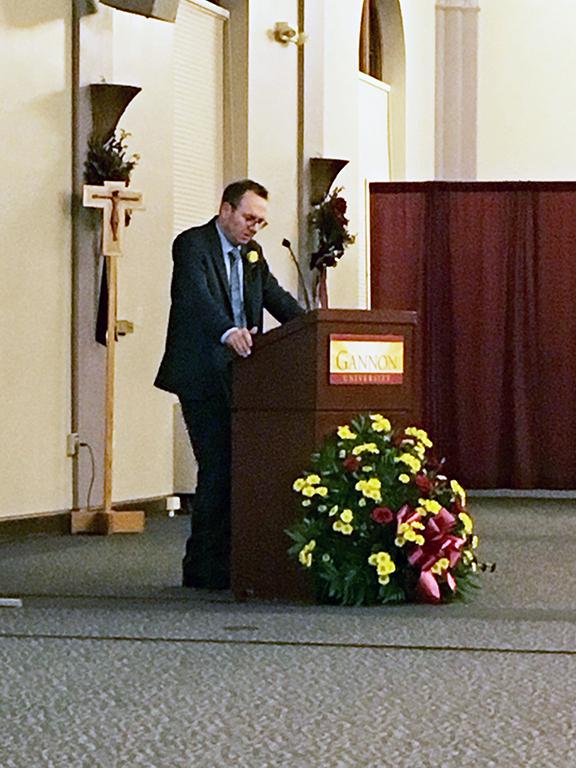By SAMANTHA GRISWOLD
managing editor, news
Gannon University students, staff and faculty eagerly gathered in the Yehl Ballroom Tuesday evening for the third annual Bishop Donald Trautman Lecture.
This year’s lecture was titled “Rethinking Poverty: Insights from Catholic Social Teaching,” and was given by James Bailey, Ph.D., an associate professor in Duquesne University’s theology department.
The evening began with a welcoming statement from Eric Dart, Ph.D., an instructor in Gannon’s theology department.
Then an opening prayer was given by Elizabeth Merski, a sophomore theology major. During her prayer, Merski referenced John the Baptist and asked for the strength to help us see those in need.
James Menkhaus, Ph.D., an assistant professor and chairperson in the theology department, provided an introduction for Bailey and said that the church has much to offer in the way of addressing social concerns.
“The church cannot and must not remain silent on the issue of poverty,” he said.
He also said that Bailey, the author of “Rethinking Poverty: Income Assets and the Catholic Social Justice Tradition,” would like to see a society that is more caring and just.
Bailey began his speech by quoting Pope Francis on how inequality is the root of social evil.
“[Poverty] isn’t the most appealing topic, but it’s an important topic and it can’t be ignored,” Bailey said.
He also talked about how the gap between the rich and the poor has been growing in the United States for quite some time.
He cited statistics that 60 percent of the U.S. population earns 23 percent of the nation’s income and said that his concern lies in encouraging impoverished individuals to gain assets.
He connected this thought to Catholic Social Teaching by stating that this area of thought has always been concerned with the importance of owning private property.
He said that if property ownership could be expanded to the poor, tensions between the wealthy and poor could be reduced.
He then launched into the difference between two areas of thought surrounding solutions to property: the income paradigm and the asset paradigm.
The income paradigm focuses on increasing income for poor households. In the U.S., poverty is determined by whether or not you fall below the poverty line, the minimum level of income needed to live.
“Most of us have a difficult time conceptualizing poverty,” Bailey said.
The asset paradigm has been increasing in popularity in the U.S. for a while, Bailey said.
This area of thought focuses on helping impoverished households build assets and savings because it has proven to be the most effective way of relieving poverty.
“The reason why most people leave poverty is because they save,” Bailey said. “Assets are not a luxury, but essentials.”
Bailey said having assets puts households in a better position to deal with unexpected events, like economic downturns or an illness in the family.
Bailey stressed the importance of changing public policies to support asset building for those who are impoverished.
Past policies that have shown to be successful include the Homestead Act, which allowed 1.5 million Americans to have ownership of land after the Civil War; the GI Bill, which was put into place after World War II and funded tuition for postsecondary education; and FHA loan, which made mortgages more attainable for people, lowered the down payment for a home and extended the loan period to 30 years rather than three to five.
Bailey also noted that though those policies offered aid to people, they also discriminated against people, specifically African-Americans.
Bailey said that current policies, including the current income tax codes, have mostly been benefitting exclusively the wealthy. Tax breaks are given for certain building endeavors, which, in 2014 reduced the pool of income tax money by $761 billion.
“To put that into perspective, that’s more than the annual defense fund,” Bailey said. “The people who make more get bigger benefits.”
He said that a response to this was the creation of the Individual Development Accounts (IDAs) program.
The IDA program gave savings accounts to the impoverished and every time they make a deposit, the amount is matched by the government, allowing them to save up for things like a down payment on a house, money to start a business or tuition money for postsecondary education.
He said that the data gained from this program have proved successful – the poor can and do save. The savings accounts had a positive effect on those who had them.
They reported acquiring of a savings account changed their outlooks for the better – they began to think in a more future-oriented way.
“All of a sudden these people who have never had savings before have $500 in their accounts,” he said. “You can see the positive effects that occur with a relatively small amount of money.”
Bishop Emeritus Donald Trautman, who served as the Diocesan Bishop of Erie for 22 years, ended the lecture by thanking both Bailey and Dart for their work organizing the event.
“This lecture highlighted the richness of Catholic Social Teaching,” Trautman said. “Pope Francis lives this every day.”
SAMANTHA GRISWOLD
[email protected]












